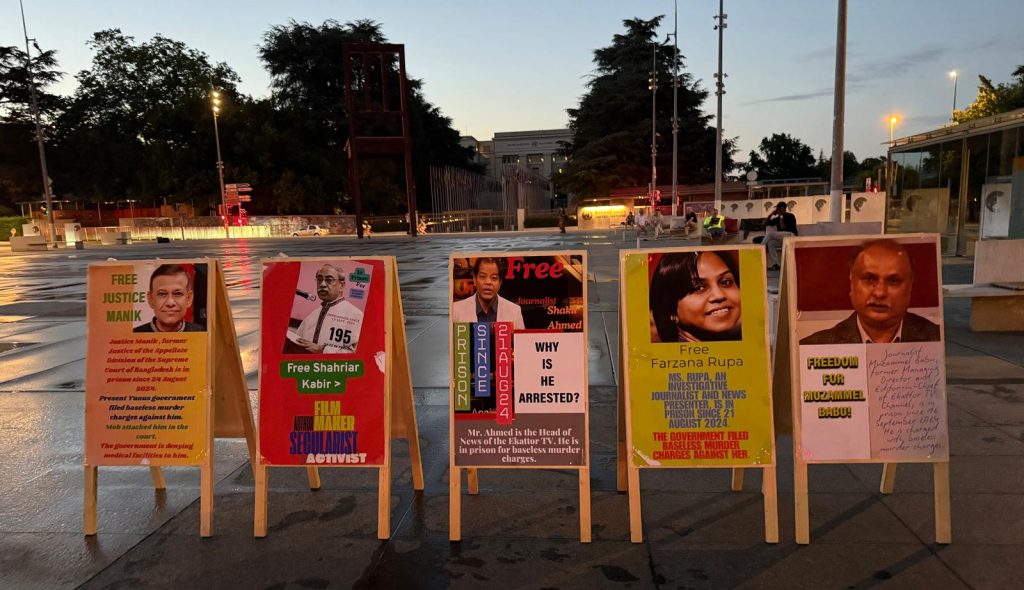A poster exhibition was held at the United Nations in Geneva from June 30 to July 2, during the regular session of the 59th Human Rights Commission, on the mobocracy, crimes against humanity, and gross human rights violations in Bangladesh.
The Geneva-based human rights organisation International Forum for Secular Bangladesh, Bangladesh Minority Alliance (Switzerland Chapter), and Tumuku Development and Cultural Union jointly organised the exhibition.
A total of 30 posters depicting the gross human rights violations of the current Yunus regime in the past ten months were displayed in the exhibition every day from 9am to 6pm.
Extrajudicial killings: GCDG lists 47 deaths since September 2024
88 expat Bangladeshis condemn persecution of journalists, suppression of free speech
Yunus regime dismisses executive magistrate Tapashee Tabassum for criticism
Tribute to Holey Artisan victims: Students defy Yunus’ militant-backed government
Chinmoy Prabhu instigated, instructed murder of lawyer Alif, says chargesheet
Student coordinators create mob, attack Patiya police station
Yunus Gang’s ‘mob’ and ‘pressure group’ theory
Abu Sayed Case: An example of fraudulence, a travesty of justice
67 rights group condemn rape of Hindu woman in Cumilla
Destruction of 1971 murals an example of Yunus’ pro-Pakistani agenda
July death toll fraud exposed: Activists seek UN accountability
Hindu temple demolished in Khilkhet after ultimatum by Touhidi Janata
July fraud busted: Saifuddin claims was shot in two cities the same day
July Conspiracy: Gazetted lists contain many fake martyrs, injured fighters
Rokeya Uni professor arrested in murder case over grocer’s ‘heart attack’
The organiser of the exhibition, Geneva-based human rights activist Rahman Khalilur Mamun, said that 30 pictures in five categories were presented in the three-day poster exhibition to raise global public opinion on the current human rights situation in Bangladesh.
The categories are Bangladesh communal violence and minority oppression; freedom of the press, suppression of voices, and journalistic oppression; demand for the unconditional release of Shri Chinmoy Das Prabhu; mob terrorism and sexual abuse of women and children; and Sheikh Hasina, the world conscience—mother of humanity.

A large number of foreign diplomats, thousands of foreign NGO workers, and hundreds of human rights activists who came to the human rights session expressed their heartfelt feelings after learning about the horrific, heartbreaking situation in Bangladesh.
Pashtun community leader and human rights activist Fazlur Rahman Afridi said in a tearful voice: “I have lost the language to express my feelings; such barbaric, hellish torture is being repeated in Bangladesh.”
He said that Mohammad Yunus has tarnished the Nobel Peace Prize by sponsoring such a demonic flow of events. Forming a world opinion on such a terrible human rights violation is important.
On the second day, General Secretary of the Swiss Socialist Party in Geneva, Sylvain Thevot (Secretary PS), came to visit the exhibition.
He expressed his deep sympathy to all victims of mob violence. Mr. Thevot said he would discuss his concerns in his party forum meeting about the Bangladesh situation.
On the closing day of the exhibition, on July 2, Claudia Wadlich, a leader of a German-based human rights organisation, visited the exhibition.
She was deeply sad about the situation in Bangladesh at present. Madame Claudia said: “For long, I have been following the Bangladesh chapter. In the last 11 months, we have observed mob violence, human rights violations, persecution of minorities, torture of innocent political people, and their imprisonment. This interim government has banned political activities of the Awami League and suspended press freedom and freedom of expression.
Many human rights activists and diplomats commented on the ongoing minority persecution and crimes against human rights in Bangladesh, saying that the Yunus-led government is heading towards a dysfunctional, failed state and civil war due to the increasing terrorist policies.
On social media, many people—mostly the Bangladeshi lower and middle class—now regret that they supported the anti-government movement. They are now saying publicly that they were in a better situation during the tenure of Bangabandhu’s daughter and five-time Prime Minister Sheikh Hasina.